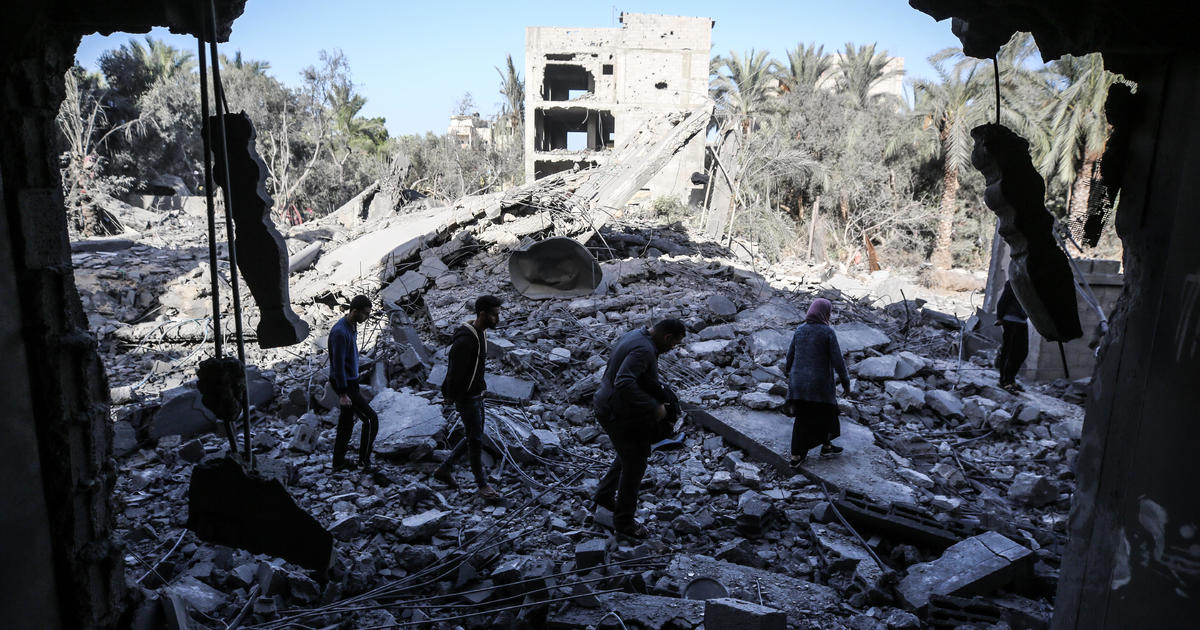A pause in the fighting between Israel and Hamas was supposed to have taken effect Friday morning in Gaza as part of a four-day cease-fire deal that calls for Hamas to free at least 50 hostages and Israel to release dozens of Palestinians from its prisons. Minutes after the truce was set to begin, Israel’s military sounded alarms in several villages near Gaza warning of possible incoming rocket fire, but there was no immediate word of ongoing violence.
The cease-fire had been set to start at 7 a.m. local time, which is midnight on the East Coast of the U.S. The Israeli military did not make any official announcement at that time, but a spokesperson stressed in a social media post 25 minutes earlier that the suspension of hostilities was temporary, and “the war is not over yet.”
Israeli Defense Forces Lt. Col. Avichay Adraee warned that the northern Gaza Strip remained “a dangerous war zone and it is forbidden to move around” there, adding that people in the decimated Palestinian territory “must remain in the humanitarian zone in the south of the Strip” and only move toward that area on one road, adding that “the movement of residents from the south of the Strip to the north will not be allowed in any way.”
An initial batch of 13 hostages being held by Hamas militants were slated to be released at 4 p.m. local time Friday, according to a Qatar foreign ministry spokesperson. The names of those hostages were already provided to Israeli authorities, the Qatari official said.
The Red Cross would be involved in the hostage handover, but the exact location it would take place was being kept secret for security reasons, the official added. According to Qatari officials, children will be released with their mothers and won’t be separated.
“We welcome the announcement from Qatar and expect to see a number of hostages coming out of Gaza tomorrow,” a White House spokesperson said in a statement to CBS News Thursday night.
Under the terms of the deal brokered earlier this week with the help of the U.S., Egypt and Qatar, 50 hostages — all women and children who were kidnapped by Hamas militants during their Oct. 7 assault on southern Israel — will be freed in batches over four days. They are among an estimated 240 captives who are still believed to be held in Gaza.
Majdi Fathi/NurPhoto via Getty Images
Three American hostages are expected to be among those 50, per a senior Biden administration official.
When asked by reporters Thursday whether the youngest American hostage, Abigail Mor Idan — whose fourth birthday is Friday — would soon be released, President Biden on Thursday responded, “fingers crossed.” Both Idan’s parents were gunned down by Hamas.
In exchange, the Israeli military has agreed to a four-day pause in the war, as well as the release of 150 Palestinian women and children who are being held in Israeli prisons.
“Of course, our aim is for this deal to end with a lasting truce,” said Majed Al-Ansari, a spokesperson for Qatar’s foreign ministry, in a news conference Thursday. “Right now, of course, the confines of this deal are these four days that are subject to a second phase, and following phases of expanding the pause through the formula of getting more hostages out, and therefore getting more time for the parties. We are hoping that momentum will carry, and that we would find this would open the door for further and more deep negotiations towards an end to this violence.”
The Israeli government said in a statement Tuesday that the release of “every 10 additional hostages” on top of those 50 “will result in one additional day in the pause.”
Up to this point, only four Hamas hostages have been released, two Americans and two Israelis.
Al Ansari said he expects the release of Palestinian prisoners to follow closely after that of the Gaza hostages. According to Palestinian prisoner rights’ groups, there are an estimated 7,000 Palestinians currently jailed in Israel, including over 200 Palestinian children and about 75 women, with dozens arrested in the past few weeks alone.
Samaher Aouad’s daughter, Norhan, is on Israel’s list of jailed Palestinians who might be freed as part of the deal. Norhan was arrested at age 15 for the attempted stabbing of an Israeli soldier nine years ago.
“The Israeli occupation stole her childhood and that’s what I feel sad about,” Aouwad told CBS News. “No one can replace her childhood.”
Aid trucks were expected to move into Gaza immediately after the cease-fire began through southern Gaza’s Rafah crossing with Egypt, Al-Ansari disclosed. Diaa Rashwan, chairman of Egypt’s State Information Service, said in a statement early Friday morning that about 34,000 gallons of fuel would be entering Gaza daily during the cease-fire, along with about 200 daily aid trucks carrying food, medicine and water.
“The need is so great, that no matter how much aid you are going to bring in, there will be certainly more need for aid,” Al-Ansari said.
At kibbutz Nir Oz, Noam and Lior Peri know their 79-year-old father Chaim would not be among the first hostages released.
“It is really hard to think how he’s coping, how he’s dealing with those, probably days and nights that he doesn’t even know where he is, what time is it,” Noam told CBS News.
“I have huge faith that I will see him again,” Lior added.
The fighting in Gaza has been unrelenting since Hamas invaded Israel on Oct. 7, killing more than 1,200 people, most of them civilians, according to Israeli officials.
The Hamas-run Gaza Health Ministry says more than 14,000 people in Gaza have since been killed in Israel’s retaliatory ground incursion and air strikes.
— Imtiaz Tyab, Margaret Brennan, Khaled Wassef, Holly Williams, Lilia Luciano, Jordan Freiman and Kathryn Watson contributed to this report.


